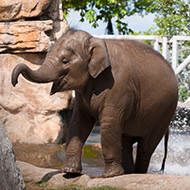
Chester Zoo and the University of Surrey are collaborating on the trial.
A vaccine trial for elephant endotheliotrophic herpesvirus (EEHV) has begun, as reported by BBC News.
Chester Zoo, in collaboration with scientists at the University of Surrey, has begun the process of trialling a vaccine for the deadly virus, which has killed seven of the zoo's Asian elephant calves.
Formally characterised in 1999 by researchers at the Smithsonian Zoo, the virus has a mortality rate of up to 85 per cent, and by the time symptoms appear, it it often too late to intervene.
Elephant keeper at Chester Zoo, Katie Morrison, told BBC News: "We've lost elephants usually between the ages of 18 months and three years," Katie explains.
"When we see symptoms - lethargy, mouth lesions - it's usually too late. It's so tough - you do everything you can, and it's not enough.”
The virus is believed to be passed from the older elephants to the calves, potentially when a calf is being weaned, when the antibodies from the mother's milk decline. Although there is still much unknown about the virus.
Professor Falko Steinbach, from the University of Surrey, told BBC News: “We know it's almost impossible to prevent infection - we're trying to prevent serious disease and death.
“Our aim is to give them a prime before infection, so the elephant's immune system knows the virus and is on the front foot.
"We're using established, safe processes, and it's important to move ahead with a trial in elephants, because there is no other animal we can test this in."
Great progress has already been made by the team, with tests and blood donations from the herd able to diagnose the virus before symptoms appear. This success was demonstrated when Indali, a five-year old Asian elephant at Chester Zoo, tested positive for the virus.
Indali underwent extensive treatment with anti-virals, immune booster and blood plasma transfusions, and she recovered – the only calf to do so at Chester Zoo since 2010.
As the BBC has reported, Professor Steinbach is hopeful that significant progress will be made towards a vaccine within five years' time.
Image (C) Shutterstock



 The latest
The latest